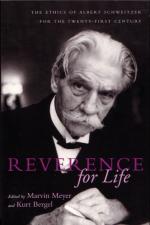|
This section contains 346 words (approx. 2 pages at 300 words per page) |
World of Health on Albert Schweitzer
Albert Schweitzer was born in Kaysersberg in what was Alsace, Germany (now Alsace, France), on January 14, 1875. He was an intelligent child, unusually sensitive and empathic to the plight of others. He studied in both France and Germany, enrolling in the University of Strasbourg in 1893.
Schweitzer wrote his thesis on German philosopher Immanuel Kant (1724-1804), earning a doctorate in philosophy in 1899. He stayed on at the University of Strasbourg, working as both a teacher and administrator. Schweitzer proved to be brilliant in many areas of study, including philosophy, religion and theology, musicology, performance as an organ virtuoso, and organ building. He published works that went on to gain success as classics in their fields, including a 1905 biography of Johann Sebastian Bach (1685-1750) and The Quest of the Historical Jesus (in 1906).
Schweitzer espoused a personal principle he referred to as "Reverence for Life"; this principle governed his life and compelled him to turn to the aid of others as his vocation. At age 30 he left his academic career to study medicine. His wife, Helene Bresslau (whom he married in 1911), took up nursing so that the two might work side by side.
In 1913, after completing their medical and nursing studies, Albert and Helene Schweitzer set off for French Equatorial Africa, which is now part of Gabon in West Africa. There, the Schweitzers set up the Albert Schweitzer Hospital. Initially housed in an old chicken coop, Schweitzer was eventually able to build a large hospital and clinic, to which thousands of Africans came long distances for treatment.
Even while working long hours in his hospital, Schweitzer continued to write about his beloved subject, philosophy. In 1923 he published two volumes entitled The Philosophy of Civilization. He also published books detailing his life, personal philosophy, and experiences: Out of My Life and Thought (1931) and From My African Notebook (1939).
Schweitzer received the Nobel Peace Prize in 1952 and Britain's Order of Merit in 1955. He used his Nobel prize money to enlarge and improve the hospital and to start a leper colony. In 1957 he spoke out about the dangers of atomic weapons tests.
|
This section contains 346 words (approx. 2 pages at 300 words per page) |


